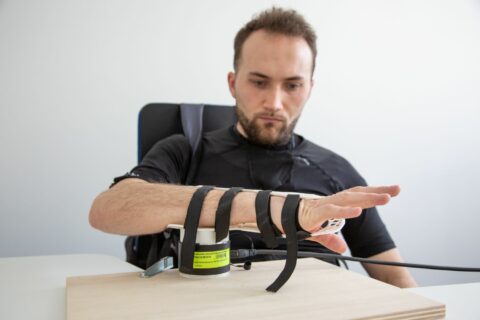Enhancing Rehabilitation after Spinal Cord Injuries: AIBE Introduces AI-Powered Intelligent Suit in HIT-Reha Project

Prof. Dr. Claudio Castellini, chair of Assistive Intelligent Robotics, is leading a groundbreaking project in collaboration with the Institute for Technical Informatics at the University of Heidelberg and the Department of Experimental Neurorehabilitation at Heidelberg University Hospital. The aim is to improve therapy outcomes for individuals with spinal cord injuries. Over the next three years, they will develop an intelligent suit that combines electrical muscle stimulation and artificial tendons, responding to the individual movement intentions of patients. The project, known as “HIT-Reha”, is generously supported by the German Research Foundation with a total funding of approximately one million euros, including a significant grant of 357,000 euros to FAU.
The exo suit, consisting of a compression jacket, forearm cuffs, and gloves, will integrate existing support systems such as functional electrical stimulation (FES) and cable pull mechanics. The key innovation lies in the AI-powered recognition of the patient’s intention to move, which is measured through integrated sensors monitoring muscle activity. Self-learning algorithms analyze this data to determine the patient’s motor intentions and adjust the assistance systems accordingly. By precisely guiding muscle contractions and cable tension, the intelligent suit enables targeted and gentler therapy, offering a promising solution for enhancing rehabilitation after spinal cord injuries.
For more information, visit this page: https://www.fau.de/2023/05/news/wissenschaft/ki-unterstuetzt-rehabilitation-nach-rueckenmarksverletzung/
Further information
Prof. Dr. Claudio Castellini
Chair for Assistive Intelligent Robotics
claudio.castellini@fau.de